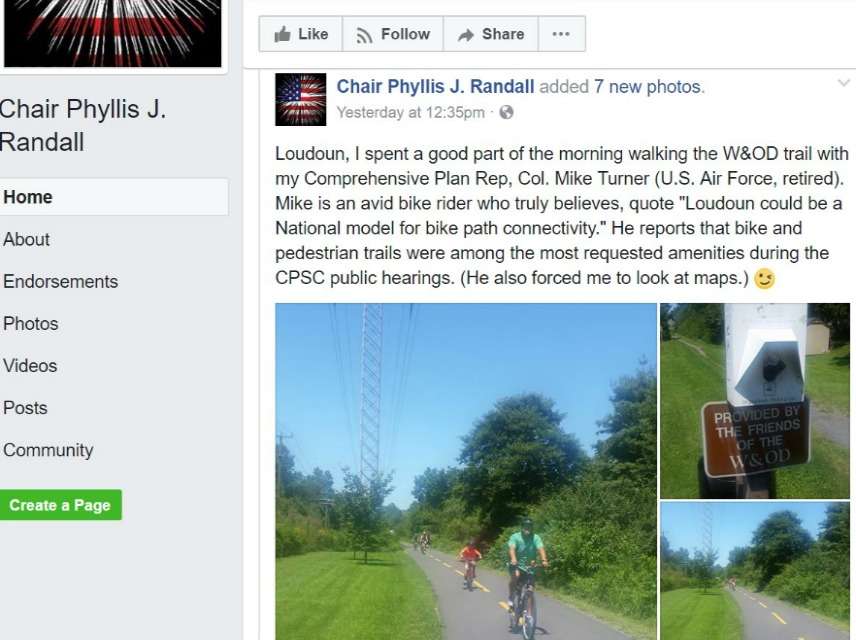Ruling Against Facebook Ban Suggests Trump's Twitter Blocks Are Unconstitutional
A federal judge says personal pages used for public purposes implicate the First Amendment.

Phyllis Randall, chair of the Loudon County, Virginia, Board of Supervisors, banned Brian Davison from her Facebook page for just 12 hours. But according to a federal judge in Alexandria, that brief banishment in February 2016 was enough to violate Davison's First Amendment rights. The ruling, published last week, reinforces the logic of a recent federal lawsuit claiming that Donald Trump engages in unconstitutional viewpoint discrimination when he blocks critics on Twitter.
Randall banned Davison, a local gadfly, from her "Chair Phyllis J. Randall" Facebook page after he posted a comment suggesting that members of the Loudon County School Board had taken official actions that benefited their relatives. "If the Supreme Court's First Amendment jurisprudence makes anything clear, it is that speech may not be disfavored by the government simply because it offends," writes U.S. District Judge James Cacheris, a Reagan appointee, in his decision siding with Davison. "The suppression of critical commentary regarding elected officials is the quintessential form of viewpoint discrimination against which the First Amendment guards. By prohibiting Plaintiff from participating in her online forum because she took offense at his claim that her colleagues in the County government had acted unethically, Defendant committed a cardinal sin under the First Amendment."
Cacheris rejected Randall's contention that her Facebook page "is merely a personal website that she may do with as she pleases." He notes that she and her chief of staff created it shortly before she took office, that it it lists her official position and contact information, and that she uses it primarily for official purposes such as describing the supervisors' work, implementing their policies, documenting her appearances as a representative of the county government, and communicating with her constituents. "I really want to hear from ANY Loudoun citizen on ANY issues, request, criticism, compliment, or just your thoughts," she says in one post. "However, I really try to keep back and forth conversations (as opposed to one time information items such as road closures) on my county Facebook page (Chair Phyllis J. Randall) or County email (phyllis.randall@loudoun.gov)."
Randall's posts are generally addressed to "Loudon"—i.e., the general public in her county. The forum that she created on Facebook was open to everyone except for Davison, who by her own account offended her by criticizing her colleagues on the school board. "Plaintiff is the only person Defendant has ever banned from her Facebook page," Cacheris notes. Since Randall reconsidered that decision the next day, "the consequences of Defendant's actions were fairly minor." Even during the 12 hours when Davison was banned, he could still read and share Randall's posts, although he could not comment on them or send direct messages to her.
Cacheris nevertheless thought Randall's violation of the First Amendment was clear enough to grant Davison the declaratory judgment he requested. "Defendant acted under color of state law in maintaining her 'Chair Phyllis J. Randall' Facebook page and banning Plaintiff from that page," Cacheris concludes. "Defendant's actions violated Plaintiff's right of free speech under the First Amendment to the United States Constitution and Article I, § 12 of the Constitution of Virginia." Although Cacheris did not say so explicitly, Davison's temporary exclusion also seems to implicate the First Amendment right to petitition the government for a redress of grievances, since she blocked him from one of two channels she identified for that purpose.
Donald Trump's Twitter account is similar to Randall's Facebook page is several significant ways. Although he created it years before he was elected president, the profile now identifies him by his public position and official address, and he uses the account mainly for official purposes, including the announcement of decisions, such as the appointment of a new FBI director and a ban on transgender soldiers, before they have been revealed elsewhere. Administration officials help maintain the account, which they explicitly describe as a way for Trump to communicate with his constituents.
All are welcome to participate in this forum except for the disfavored few who have said something that offended Trump, which is clearly a form of viewpoint discrimination. Like Davison when he was banned from Randall's Facebook page, the critics Trump blocks on Twitter can still see what he says, but they cannot directly participate in the debate it provokes on that platform. In short, if Cacheris is right that Randall's banishment of Davison was unconstitutional, it is hard to see how Trump's blocking of disfavored Twitter users can be legal.


Show Comments (57)